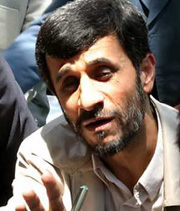|
 |
| Conservative Mahmoud Ahmadinejad became Iran's
new president on Wednesday, taking power amid international turmoil
over Tehran's nuclear ambitions and his own
past. |
Conservative Mahmoud Ahmadinejad became Iran's new
president on Wednesday, taking office amid international turmoil
over Tehran's nuclear
ambitions and his own past.
The 48-year-old conservative former mayor of Tehran, deeply loyal to
the values of Iran's 1979 Islamic revolution, won a landslide election
victory in June and was appointed president by Supreme Leader Ayatollah
Ali Khamenei.
"I therefore approve the vote of the nation and appoint Dr Mahmoud
Ahmadinejad as the president of the Islamic Republic of Iran," said a text
by Khamenei read out at an official ceremony by outgoing reformist
President Mohammad Khatami.
Ahmadinejad was warmly embraced by the leader before reaffirming his
pledge to fight for the common man.
"As a servant of the republic and a drop in the endless ocean of
the Iranian nation. I commit myself to respond to the trust and hopes of
such a nation by serving them honestly," he told Iran's leading figures
assembled at his investiture.
Khamenei leant over to congratulate the new president on his speech:
"Bravo, really good."
The president in Iran appoints ministers who manage the day-to-day
business of government. But the government's power is checked by a number
of unelected bodies answerable to Khamenei, the most powerful figure in
Iran who is appointed for life.
Ahmadinejad takes an oath of office at a further ceremony on Saturday
at which he is due to announce his cabinet.
Ahmadinejad takes over the government as Iran
edges closer to possible U.N. Security Council sanctions over its nuclear
program, which Washington says is a smokescreen
for building atomic bombs. Tehran insists its
ambitions are peaceful.
Ahmadinejad made no specific mention of the nuclear issue, but said:
"Elements of global threat including weapons of mass destruction, chemical
and biological, which are now in the hands of the hegemony must be
eradicated."
In order to break this impasse, EU diplomats have been trying to get
Iran to surrender its nuclear fuel work in return for economic incentives.
But Iran says such a compromise is unacceptable and a spokesman said it
hopes to resume nuclear fuel work on Wednesday, a move that threatens to
end EU mediation.
In Iran's opaque political system, analysts are split on whether top
policy makers are somehow setting the stage for Ahmadinejad to save the
day with a new deal or whether he is subservient to their greater national
goals.
If this mounting international pressure on the nuclear program was not
enough, Ahmadinejad also faces numerous accusations about his past.
The United States thinks he played a key role in the storming of its
embassy in Tehran after the revolution, something which he and those who
took part deny.
Austrian investigators are looking into whether he was involved in the
murder of Kurdish dissidents in Vienna in 1989. Again, his aides deny the
charges.
Ahmadinejad also faces massive economic challenges in a country where
growth is slipping and oilfields, the country's lifeblood, are losing
capacity.
The victory of the former Revolutionary Guard sent ripples of fear
through the investment community, compounded when he said he would clean
out corruption in the oil industry and give no preferential treatment to
foreign firms.
But analysts say investors should take a "wait and see" approach,
arguing that Ahmadinejad took a pragmatic line as mayor of Tehran and
could well do so again as president.
(Agencies) | 